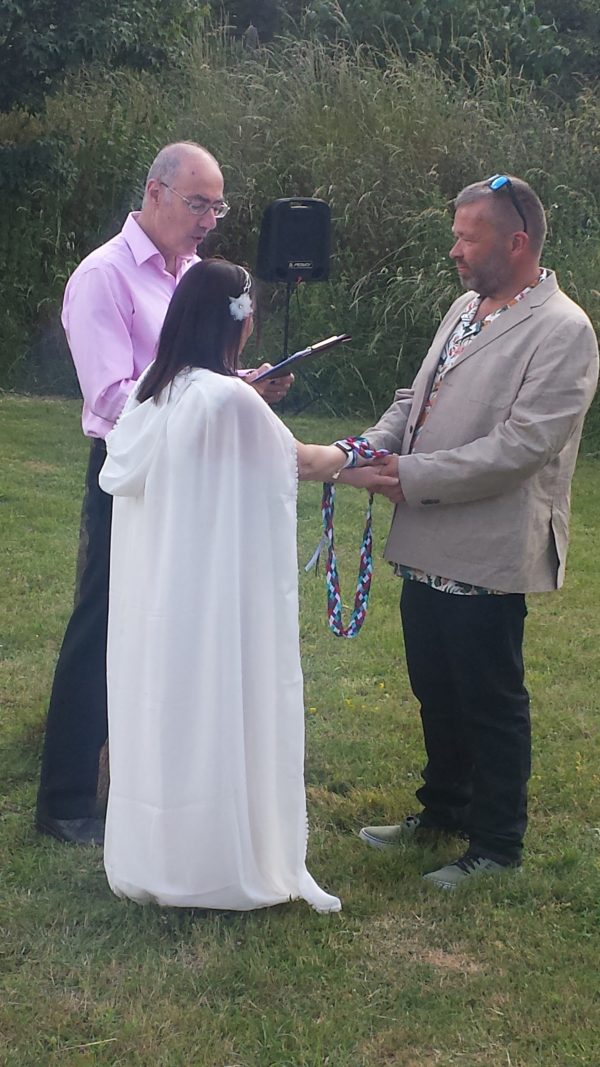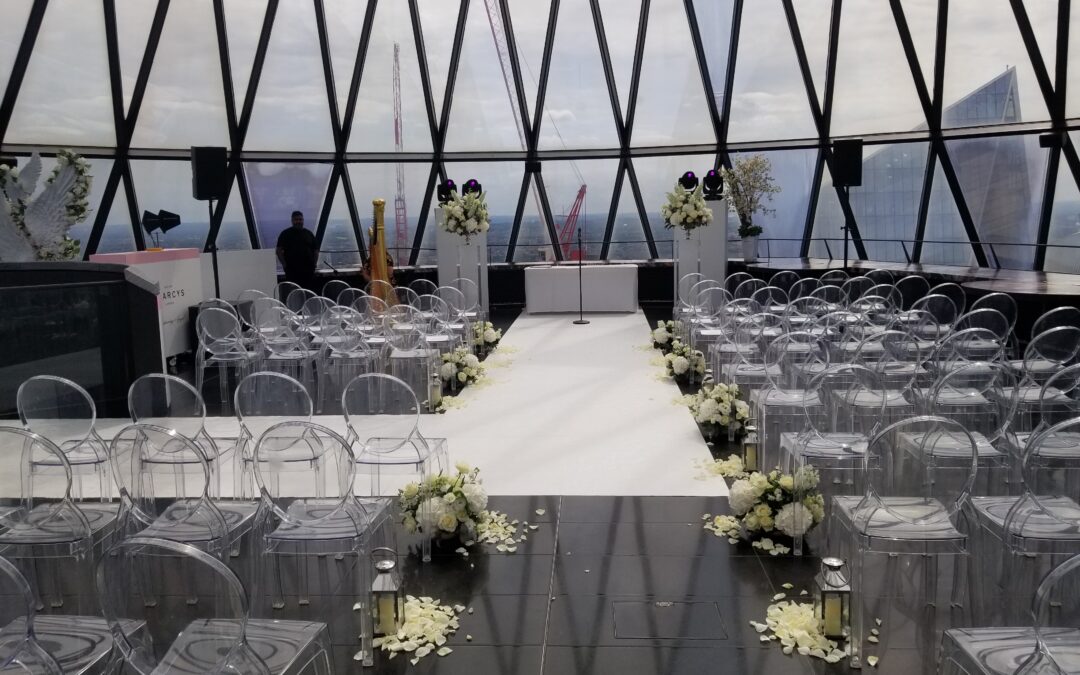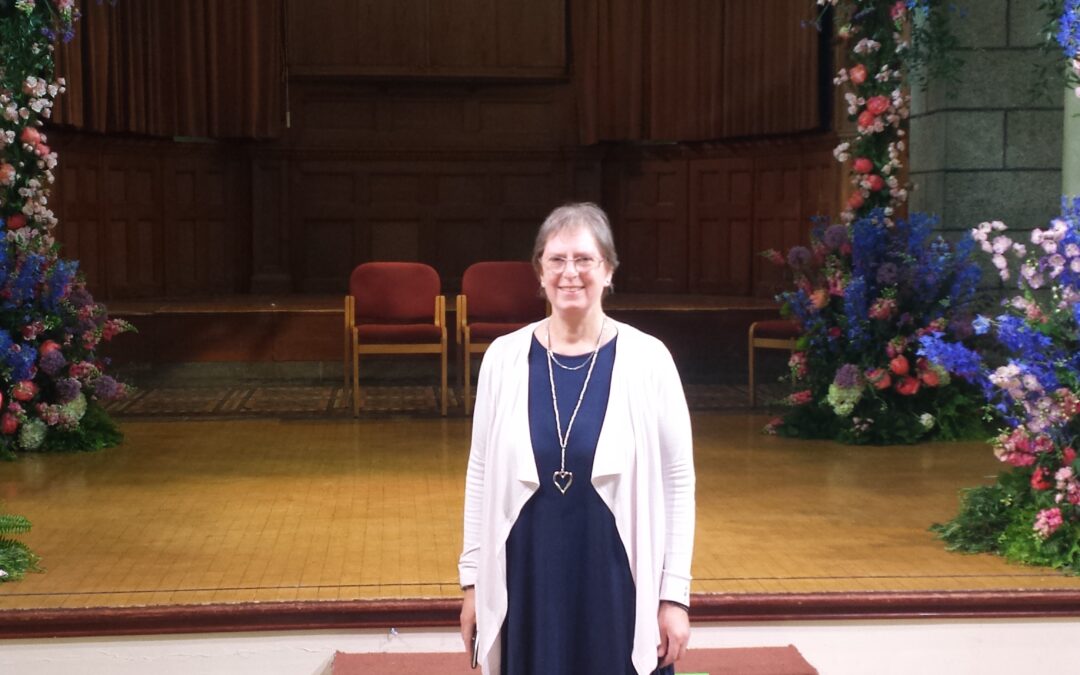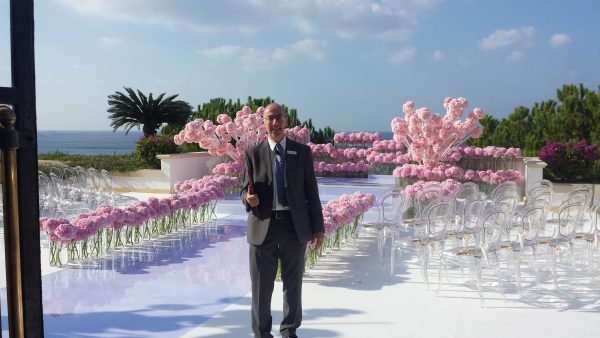
by Michael | Oct 18, 2022 | Blog
Unless you’ve actually been married already (and not necessarily even then!), you’ll make assumptions about weddings that aren’t necessarily true.
I’m going to take a few of these and set things straight.
Officiant
The registrar is not the only possible officiant. However, a marriage has got to be legally registered and, unless you marry under the auspices of certain religions (notably, C of E, Jewish or Quaker) which cover this, you’ll need to involve the Register Office.
You won’t necessarily need to go out to the Office. Registrars can come to your venue (depending on its compliance with certain stipulations) and conduct the ceremony there. The ceremony will be totally secular.
Apart from that, you have the option of a civil celebrant. (Currently – but this may change next July depending on the decision on the legislation reforms – civil celebrant ceremonies have no legal validity.) They are additional to Register Office services, offering the advantage of being fresh, even unique. They are certainly not standard and can reflect the couple’s beliefs and personalities.
Ceremony
With a civil celebrant, you have choice as to the type of ceremony you opt for. It can be quite wacky – but doesn’t have to be so. It can be relatively conventional. It can be part or wholly religious. So don’t go thinking that celebrant ceremonies have to be woo-woo!
But they can be, of course.
Cost
Everyone assumes that you need to take out a couple of mortgages to finance a wedding. Indeed, that may be the case, if you think too big. However, there are ways to reduce costs (eg making your ceremony off-peak, operating a cash bar, etc.).
But the point is that this should be a unique, unforgettable day, and that it really is worth pushing the boat out this once. You can’t put a price on memories.
Pressure on Couples
Your wedding may be subsidised or even paid for by others; that doesn’t mean that someone else should dictate what goes in, or stays out of, the agenda. It’s your big day, and that fact should be respected..
If pressure is being applied regarding the ceremony, remember that your officiant will be there for you and will support you.
So I hope these canards have been laid to rest. If I can help disperse any other misconceptions, don’t hesitate to ask.

by Michael | Aug 23, 2022 | Blog
This may seem like an odd question! But you may need help deciding when to marry. By that I mean the most advantageous time, day and type of ceremony for you. (Not after downing half a dozen cocktails!)
The Ceremony
Proposals for new wedding legislation are going through parliament (slowly!) as I write. But we’re a few months away from any declaration and then the legal process won’t be that quick. So what follows is still up-to-date advice.
Register Office
Waters are slightly muddied these days, as Register Offices tend to be understaffed since COVID.
In principle, you can make an appointment, and go down there on the appointed day with two witnesses and have a 10-15 minute non-religious ceremony. That’s it.
Some registrars will come out to a licensed venue (at a significant cost) and conduct the wedding there, but this is not so easy to arrange nowadays, especially bearing in mind the staff shortages I referred to.
Alternative Ceremonies
Religious
Basically, nothing has changed regarding conventional church weddings, and that alternative is self-contained and standardised. You arrange this through your priest.
Part- or non-religious
For a unique, tailor-made service, you have a third alternative, which is where I could come in. A celebrant-led ceremony could contain as much – or as little – religion as you want, and also include rituals of your choosing. The whole service can be arranged according to your vision – even the venue. Your celebrant will be delighted to advise and guide you. Your ceremony can be as personalised as you wish.
When to Marry
As you might expect, peak periods (like July and August) tend to be more expensive. Weekends usually cost more, as do high season dates. Bank holidays and celebrations such as Valentine’s Day are likely to come out more expensive, and evenings can cost more than mornings/afternoons.
Whatever your choice, you will probably need to book well in advance, and give your guests plenty of notice. Especially if you’re opting for a destination wedding.
Discounts
It doesn’t normally hurt to ask suppliers if they’ll offer any reductions, especially if your event is out of season. They can only say no!
Conclusion
There’s plenty to think about, then, but I hope that these remarks shed some useful light, at least. You may need to be flexible and should certainly do some research, but the results can be so worthwhile.
Never forget that it is your big day, and you deserve to get it right.
Do speak to me. I’d love to help you further.

by Michael | Jun 7, 2022 | Blog
Returning to day-to-day affairs seems a little mundane, after the weekend we’ve just had! It’s been even harder for me, as I celebrated my birthday right in the middle of the long weekend. Anyway, I hope you enjoyed the Jubilee (and my birthday!).
A few weeks ago (I’m afraid I got distracted, and put it off!) The Daily Telegraph published an interesting article. Apparently, marriages in places of worship now (as of 2019) account for less than a fifth of all ceremonies. This is the first time such a drop has been recorded – and actually represents a record low.
Religious ceremonies accounted for 18.7% of opposite-sex marriages, and same-sex a mere 0.7%.
One reason suggested was that more couples are choosing to live together, rather than marry, but that doesn’t really explain the drop in the religious option. I wonder if it is more connected with the drop in active church-going.
Incidentally, I wonder if this will get worse before it recovers. Faced with all the uncertainty around Covid and social distancing, people prefer the greater flexibility of a civil celebrant to the rigidity of the Church.
I am not going to knock religious ceremonies (especially as I chose to marry in a full religious ceremony myself!). Obviously, they appeal to those religiously inclined, and can offer a personal, meaningful, spiritual and beautiful ceremony in a special setting.
Drawbacks could be perceived to be that they are rather one-size-fits-all. The basic liturgy is followed, and will be the same – or similar – for each couple. There is little flexibility in readings, texts, ritual etc., whereas a celebrant-led service can provide all these.
There can be complications, such as a mixed-marriage, which is no problem for a civil celebrant, but which may present difficulties for the priest. Moreover, a full-blown religious service can be a bit much for people who are only lukewarm towards religion, as it is.
The Church can be a lovely setting, but a civil venue can be chosen that is equally, or even more, spectacular and atmospheric.
So each to their own, of course. There is plenty to be said for religious weddings, but they are not everybody’s cup of tea. A personalised celebrant-led ceremony may well tick all the boxes.
To find out how, a chat with me may be all that you need!

by Michael | Sep 13, 2021 | Blog
Nowadays, fewer people are choosing a full religious service to mark their marriage. But the Register Office ceremony can be uninspiring, both regarding content and delivery.
That’s why there’s increasing interest in celebrant-led ceremonies.
These specialise in letting their clients choose what they are going to include in their service (and exclude!).
So how can you personalise your ceremony?
Venue
You can choose (as long as you can afford it!) the venue that really hits the mark for you. It may be quirky (like a pod on the London Eye, an aquarium, or an old favourite like a castle or a hotel). It can be outdoors (if you gamble on our climate!) or indoors. It can be grand, modest or somewhere in between.
What you choose will reflect your personalities.
Décor
You can individualise your wedding décor. This may include invitations, signage and seating plans. You can commission this, or do it yourself (given the time and creativity).
Flowers
As well as beautifying things, flowers too will reflect your personalities. They may, or may not, be seasonal, exotic, simple, ravishing, or your own themed colour(s).
The flowers can extend beyond the bridal bouquet to table and room decoration (as in the photo) and even arches.
Dress
These days, you may not choose to wear the traditional clothes. So a bride might shun white, or even a dress. The groom may prefer to dispense with a tie. You can still look original and fetching, and declare your personality.
Ceremony
There are lots of ways to personalise the ceremony itself. You may go for a ritual (what about a handfasting?) or a recital of how the two of you got together and/or why you stayed together! You may want to write your own vows. And so on.
Your civil celebrant should be able to help you with all this, and positively channel your affection, humour and potential emotion.
So the whole service can reflect your personalities and beliefs and be very, very special.
I’d love to be of help to you constructing this. Just contact me!

by Michael | Aug 16, 2021 | Blog
Do you fancy a traditional full religious wedding service? Many still do, although these are becoming less popular. You know what you’re getting with such a service – and that’s precisely what drives some people away. They prefer a unique, personalised ceremony to a standardised, predictable service.
The same criticism can be levelled at Register Office services. They tend to follow the same pattern. Moreover, some registrars have not been trained in public speaking and sometimes fail to deliver a memorable service.
An unexpected option
Not everyone’s aware of this choice, but a civil celebrant may be a better bet. They can offer a tailor-made order of service, which will make the ceremony very special and individual. Additionally, they will be very experienced in public speaking and can ensure that nobody is disappointed with the presentation. And what they offer does not have to be way-out or woo-woo!
Venue
Another advantage of a civil celebrant is that you can be married by them wherever you choose (subject to permission etc., of course!). So indoors or outdoors is not a problem. Conventional venues, like hotels, are available, as are quirkier ones, such as castles, marquees, beaches, warehouses, in woodlands, beside canals, etc.
Decor
You can individualise your wedding further by choosing original décor. Put your stamp on the invitations, seating plans and general signage.
Flowers
Flowers are another way to personalise the proceedings. One example is the display at a Cyprus wedding I conducted (see photo above). You may choose a floral arch, unique bridal bouquets and table furnishings.
Dress
The days of obligatory formal dress have gone for many people. The bride doesn’t have to wear white; the groom might not wear a suit. They can still show originality and style, however. For example, the groom might wear coloured socks or a special cravat, the bride may wear sandals.
Ceremony
I’ve already hinted at this, but a civil celebrant ceremony allows you individualisation. You can write your own vows. These can be moving and sometimes very funny! You can include ritual – a simple example would be the Loving Cup.
You could also include some religious elements, if you want.
You can invite family and friends to participate in the service, and, of course, the register (ie the degree of solemnity) is something you and the celebrant can agree on.
All of this, especially preparing the ceremony, is something I’d love tohelp you with.





